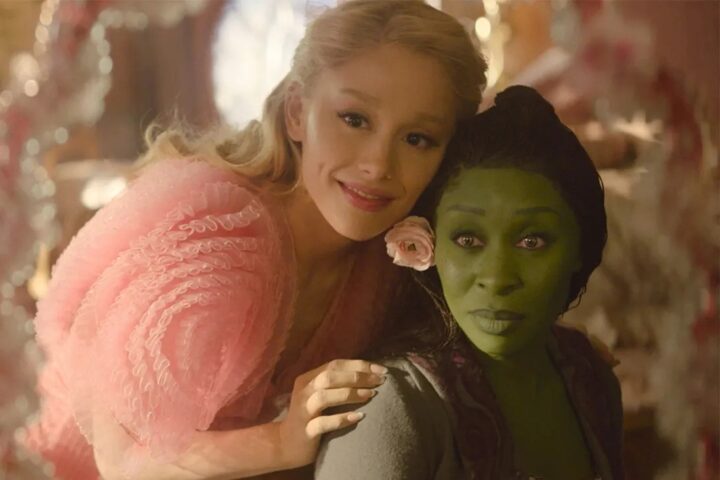“Just think,” Sir Lancelot (Taran Killam) muses as he celebrates his gay wedding at the end of Monty Python’s Spamalot. “In a thousand-and-eighteen years time, this will still be controversial.” Killam puts special emphasis on the “eighteen,” an addition to the script that nods to the supposed ways in which Spamalot remains relevant nearly two decades after the Tony-winning musical adaptation of Terry Jones and Terry Gilliam’s 1975 film Monty Python and the Holy Grail tore up the 2004-2005 Broadway season.
The construction of the joke suggests that not much has changed—either for good or ill—in the past decades. That’s hardly true, because when Hank Azaria delivered the punchline in 2005, gay marriage wouldn’t be legalized in New York State for another six years. It’s surprising how much of Spamalot’s humor, especially the gay jokes, now feels rooted in an earlier time. Even peppered with choreographic references to an iconic Drag Race lip sync and the sounds of Grindr notifications, Lancelot’s big coming-out disco number is more or less a relic, amusing primarily through the gauze of nostalgia. In an attempt to make the glitzy “You Won’t Succeed on Broadway” push through the potential audience discomfort in 2023 (the rest of that title line is “if you don’t have any Jews”), there’s a George Santos gag that somehow already feels old hat.
It’s not that either of those songs weren’t funny originally. Spamalot, as staged by the late Mike Nichols in that dominant premiere, was a giddy delight from top to bottom. And the original cast album remains a testament to the show’s scrumptiously irreverent good nature, the cleverness of Eric Idle’s lyrics, and the razzle-dazzle buoyancy of Idle and John Du Prez’s music. But not every joke told 18 years ago is going to land the same way now. Indeed, in its restaging, Spamalot has become a sort of musical theater palimpsest, a monument to what we found funny in America in 2005 resting on a pedestal of 1970s British absurdism, newly draped with some 2023 fabrics intended to keep those older structures from corroding.
So if Lancelot’s vaguely political proclamation doesn’t justify a Spamalot revival, what does? In an age where revival most often means reinvention (like Daniel Fish’s Oklahoma!), revitalization (this season’s Merrily We Roll Along), or just plain celebrity-driven resplendence (Sweeney Todd and The Music Man), this revival is none of these. Josh Rhodes’s production is a faithful, if smaller-scale, tribute to Nichols’s original staging, with nary a sight gag nor moment of slapstick that surprises. Even Paul Tate dePoo III’s set offers cartoonish drops and projections that basically pay homage to the splashier vision of Spamalot you remember.
For a show inspired by a comedy troupe defined by absurdist outlandishness, this Spamalot seems content to play it safe. Its ensemble cast largely colors inside the lines, too, with one big exception: The production’s jack-in-a-box is Leslie Rodriguez Kritzer as the Lady of the Lake. While Kritzer doesn’t quite channel the Tony-winning Sara Ramirez’s tongue-in-cheek sultriness, she makes the part her own, form-fitting the songs around the nooks and crannies of her voice. Mockingly relishing self-involved pop riffs and gleefully showing off an unexpected operatic stratosphere, Kritzer wrings laughs out of every corner of her several songs.
But since the fourth wall-smashing chanteuse was always an invention for the musical, not a transplant from Jones and Gilliam’s film, the role tends to live on its own plane. Arthur’s Knights of the Round Table, for the most part, don’t quite capture the irascible British attitudes that the original company successfully channeled: With the exception of a very funny Michael Urie as the utterly terrified Sir Robin, Rhodes’s company, however genial their performances, hasn’t really coalesced around a recognizable Pythonian style.
As the stoic Arthur, the always-appealing James Monroe Iglehart doesn’t get to show off his greatest assets—his plush voice and his quick-fire improv skills—as much as he might in a meatier, quirkier part. But Ethan Slater’s lovelorn Prince Herbert, Christopher Fitzgerald’s beleaguered Patsy, and Nik Walker’s skeptical Sir Dennis Galahad are plenty quirky; Walker especially makes a meal, with Kritzer, of the score’s most meta number, perhaps its best, “The Song That Goes Like This.” But since few of the performances feel like they quite belong in the same show—Killam leans into his SNL-established silliness while Fitzgerald evokes his past performance in Young Frankenstein—the production starts to take on the rhythms of a hit-or-miss sketch show with episodic amusements instead of dramatic momentum.
It’s maybe not a shock that some of the revival’s slickest laughs come not from Monty Python nor the musical’s script but from memes. There’s a gloriously well-integrated instance of a French pageant entrant hollering “France!,” and Monty Python’s Knights of Ni at one point say “Angela Bassett did the thing.” If you have no idea what the previous sentence is talking about, Spamalot’s attempts to pander to a TikTok generation will be, alas, lost on you.
But a great number of young people were enchanted by Monty Python’s Spamalot those long 18 years ago. So if, sometimes, the best reason to revive a musical is simply to introduce old jokes to a new generation, this may be a Spamalot most enjoyed by those discovering the material, unencumbered by the mores of the past, for the first time.
Spamalot is now running at the St. James Theatre.
Since 2001, we've brought you uncompromising, candid takes on the world of film, music, television, video games, theater, and more. Independently owned and operated publications like Slant have been hit hard in recent years, but we’re committed to keeping our content free and accessible—meaning no paywalls or fees.
If you like what we do, please consider subscribing to our Patreon or making a donation.







“Spamalot is now running at the St. James Theatre.” Where’s that, exactly? Sounds like a London venue, given the spelling. Oh, I see, it’s in America. Well, I’m not sure what the point is of reviewing a theatrical production that only a tiny proportion of Americans – and no one else on the planet – is able to attend. Is it touring in, say, Kenya or Kazakhstan?